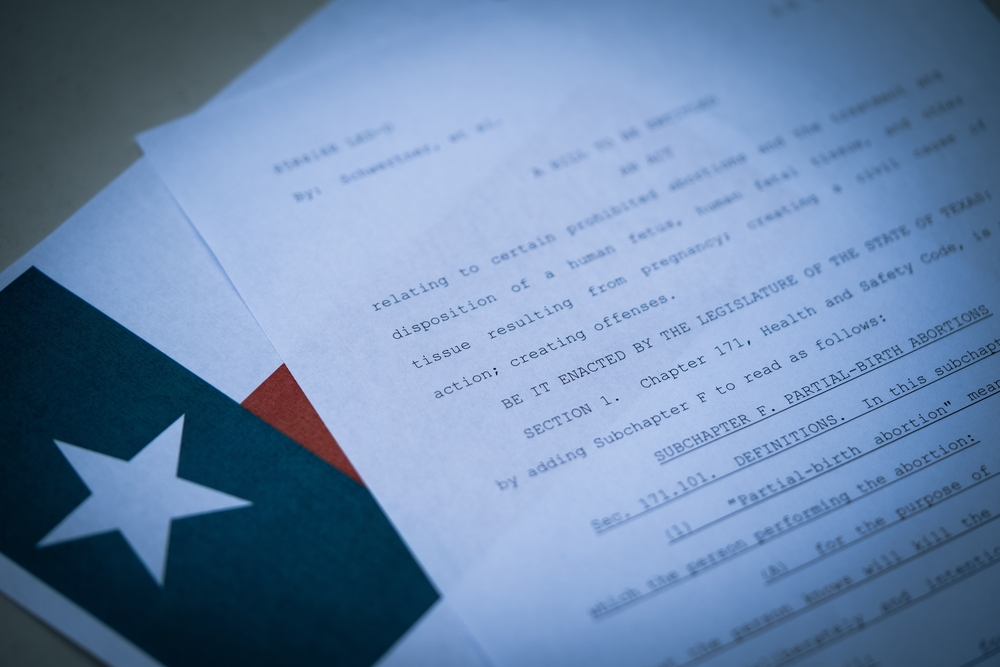On September 1, the Texas abortion restriction law known as SB8 or the Texas Heartbeat Act went into effect. This new Texas law restricts the timing of abortions to before fetal cardiac activity can be detected on an ultrasound. It is estimated that this can be around 5-7 weeks of pregnancy. The challenge with this is that most women are unaware that they are pregnant at this time. This law conflicts with the Supreme Court’s previous rulings that only permit abortions up to the gestation of 22-24 weeks. Up to this time period, a fetus is not viable. It’s expected that this law will restrict 85% of abortion procedures in Texas.
This law effectively bans abortion for everyone once an electric activity has been seen on an ultrasound. If the mother’s life is at risk, there is language included in the law to permit emergency intervention from doctors. But experts argue that the language is vague, creates grey areas, and could put patients’ lives and health at risk. If statutory rape resulted in a pregnancy, the pregnancy would not be legally allowed to be eliminated. The same holds true for those who become pregnant through incest. Additionally, if fetal abnormalities could result in fetal death or the diagnosis of a fatal disease, SB8 would prohibit the termination of a pregnancy.
So far, Texas’ restrictions on abortions are the toughest in America. During the upcoming term of the Supreme Court, Mississippi’s ban on abortions after the 15-week mark will be on the docket.
Shifting Enforcement by Government and Law Enforcement to Private Citizens
The Texas Heartbeat Act allows private citizens to sue abortion providers or anyone else they suspect of helping a woman obtain an abortion. This law shifts the method of how laws are normally enforced. This act removes the government and law enforcement from enforcing the act and hands the enforcement over to private citizens. It’s believed to be the first type of law enforced by private citizens.
Those in support of this new law hope that the language will skirt the legal system. Normally, those opposed to a law enforced by law and government officials can sue the state. But under SB8, no state official is enforcing SB8. Therefore there is no one at the government or law enforcement level to sue. Instead, a private citizen can sue other private citizens - specifically those who assisted someone who secured an abortion. The law also ensures that private citizens do not need to have a connection to the person they are suing.
According to Texas SB8, a person who “knowingly engages in conduct that aids or abets the performance or inducement of an abortion” can be sued in Texas. This includes family members, health care workers, front desk staff at a clinic, a person providing transportation to a woman seeking a ride to a clinic and more.
If the lawsuit is successful, the plaintiff is eligible to receive $10,000 in damages plus the cost of legal fees. It’s believed this bounty law will increase the number of lawsuits filed in Texas. In addition, those filing a lawsuit may be shielded from having to pay the defendant’s legal fees and have up to six years to file.
Legal Challenges
On September 8, the Supreme Court refused to block this law. In their ruling of 5-4, the Supreme Court explained that this case “presents complex and novel antecedent procedural questions.” While legal challenges to SB8 continue to work through the legal system, the law remains in effect.
The next day - September 9, the Biden administration sued Texas over the near-total ban on abortion. U.S Attorney General Merrick Garland shared that the U.S. Department of Justice (DOJ) sued Texas as this law violates the Supreme Court’s precedent that abortion is legal. Additionally, Texas law conflicts with federal law by reducing the authority held by federal agencies. It also leaves federal officials open to be found liable under this law.
“The United States has the authority and the responsibility to ensure that no state can deprive individuals of their constitutional rights through a legislative scheme specifically designed to prevent the vindication of those rights,” Mr. Garland shared in the lawsuit.
In opposition to the DOJ’s lawsuit against Texas over SB8, Texas Right to Life, an anti-abortion group shared in a statement that the DOJ “will quickly find that they do not have jurisdiction to stop the Texas Heartbeat Act.” As with this controversial issue, there are passionate people on both sides.
Texas Right to Life set up a website on the GoDaddy web platform to collect anonymous tips for when SB8 was being violated. Within a day, the website was spammed with fake reports. Officials at GoDaddy informed this group that their website violated the terms of services and would not provide hosting services. NPR confirmed that GoDaddy felt that the Texas Right to Life website violated its prohibition on collecting personally identifiable information about someone without the person's consent. Additionally, it violated the privacy or confidentiality of another person.
As abortion is not a topic discussed lightly with passionate supporters and opponents, legal challenges are expected to mount. As part of this bill, other states are watching Texas and the Heartbeat Act to see whether the law is struck down. Opposition groups are concerned that Texas has created a blueprint to restrict access to abortion that could be replicated in other states across the country.












